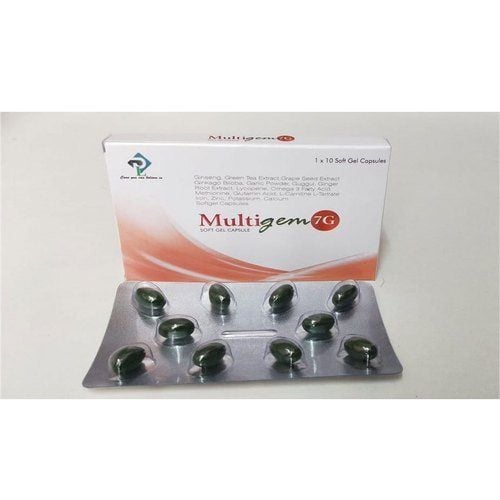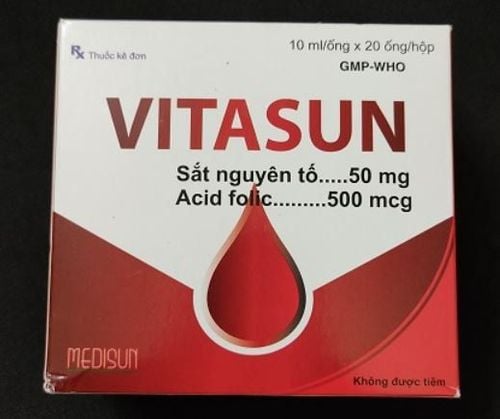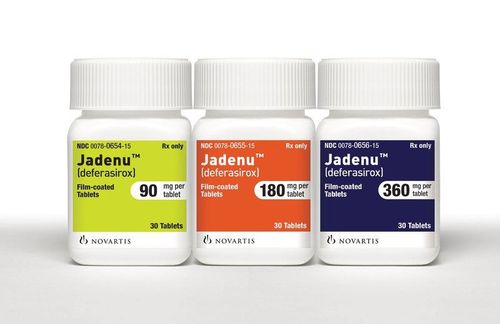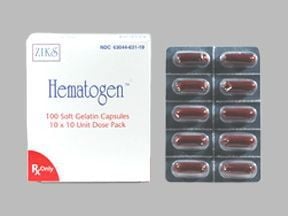This is an automatically translated article.
Atidaf 250 is indicated in the treatment of chronic iron overload... Let's learn about the uses and notes when using Atidaf through the article below.
1. What are the effects of Atidaf 250?
Atidaf 250 contains the active ingredient Deferasirox 250mg, prepared in the form of dispersible tablets, indicated in the following cases:
Chronic iron overload in patients with Beta Thalassemia major due to frequent blood transfusions or children from 2 to 5 years of age, treatment with Deferoxamine is contraindicated or treatment with Deferoxamine is not effective; Chronic iron overload in patients with contraindications to treatment with Deferoxamine or ineffective treatment with Deferoxamine; Chronic iron overload in patients with non-transfusion-dependent thalassemia syndrome with at least 5 mg iron/g dry weight of liver and serum ferritin greater than 300 mcg/L.
2. Dosage of the drug Atidaf 250
Atidaf 250 belongs to the group of prescription drugs, the dose used is prescribed by the doctor based on the patient's condition. Some recommendations on the dosage of Atidaf 250 are as follows:
Adults with excessive iron:
The recommended starting dose is 20mg/kg/time/day; The recommended maintenance dose is 20-40 mg/kg/day. Not more than 40mg/kg/day; Treatment of adults with thalassemia major with an initial dose of 10 mg/kg/day. Children with excessive iron overload (children over 2 years old):
The recommended starting dose is 20mg/kg/time/day; The recommended maintenance dose is 20-40 mg/kg/day. Not more than 40mg/kg/day; Treatment of thalassemia in children with an initial dose of 10 mg/kg/day. The dose should be calculated as closest to the dose of the intact tablet. Note that the above dose of Atidaf 250 is for reference only. Patients should adhere to the correct dose and duration of treatment as prescribed by the doctor.
3. Side effects of the drug Atidaf 250
Atidaf 250 medicine can cause some side effects as follows:
Headache ; Constipation, diarrhea, vomiting, nausea, abdominal distension, dyspepsia, abdominal pain; Pruritus rash, increased transamina, proteinuria, increased blood creatinine; Renal tubular disease in children and oliguria with beta-thalassemia and serum ferritin less than 1500 mcg/L; Acute pancreatitis in a patient with or without prior biliary tract disease. If you experience these symptoms, the patient should stop using Atidaf 250 and notify the doctor for appropriate treatment.
4. Notes when using Atidaf 250
4.1. Contraindications Contraindicated to use Atidaf 250 in the following cases:
Patients with hypersensitivity to Deferasirox or any ingredient of the drug; In patients with high-risk myelodysplasia, malignancy is expected to be ineffective on chelation therapy; Patients with renal failure with creatinine clearance less than 40ml/min or SCr greater than 2 times the upper limit of normal; Patients with poor physical condition; People with malignancy; Patients with platelets less than 50 x 109/L. 4.2. Precautions for use Patients treated with Atidaf 250 should be monitored for blood counts, proteinuria, hearing and vision tests before and every 12 months during treatment. In case of suspected severe skin reaction, the drug should be discontinued immediately and not used again thereafter. In case the patient has a severe and prolonged increase in serum Transaminase, it is necessary to change the dose, temporarily stop the treatment with Atidaf 250. It is recommended not to use Atidaf drug in patients with galactose intolerance, glucose-galactose malabsorption, deficiency. severe lactase deficiency. For pregnant women: Atidaf is classified in Group C according to the classification in pregnant women. Therefore, the use of this drug in this population should be prescribed and supervised by a physician based on the benefits and risks of treatment. Lactation: Treatment with Atidaf in lactating women should be prescribed by a physician based on the benefits and risks of treatment.
5. Drug interactions
Atidaf 250 may cause the following interactions:
Strong inducers of UDP - Glucuronosyltransferases such as Phenytoin, Rifampicin and Phenobarbital; Aluminum-containing antacids; Non-steroidal anti-inflammatory drugs, Corticosteroids, anticoagulants, oral Bisphosphonates; Caution should be exercised when co-administering Atidaf with drugs metabolised by CYP3A4 enzymes such as Simvastatin, Ciclosporin, hormonal contraceptives, Repaglinide, CYP2C8-metabolized agents such as Paclitaxel, Theophylline and CYP1A2 enzyme-metabolized agents. Drug interactions occur that increase the risk of having effects and reduce the therapeutic effect of Atidaf 250. Therefore, to ensure safety and effectiveness in treating patients, it is necessary to inform the doctor about the drugs, foods and supplements. products being used before taking Atidaf.













